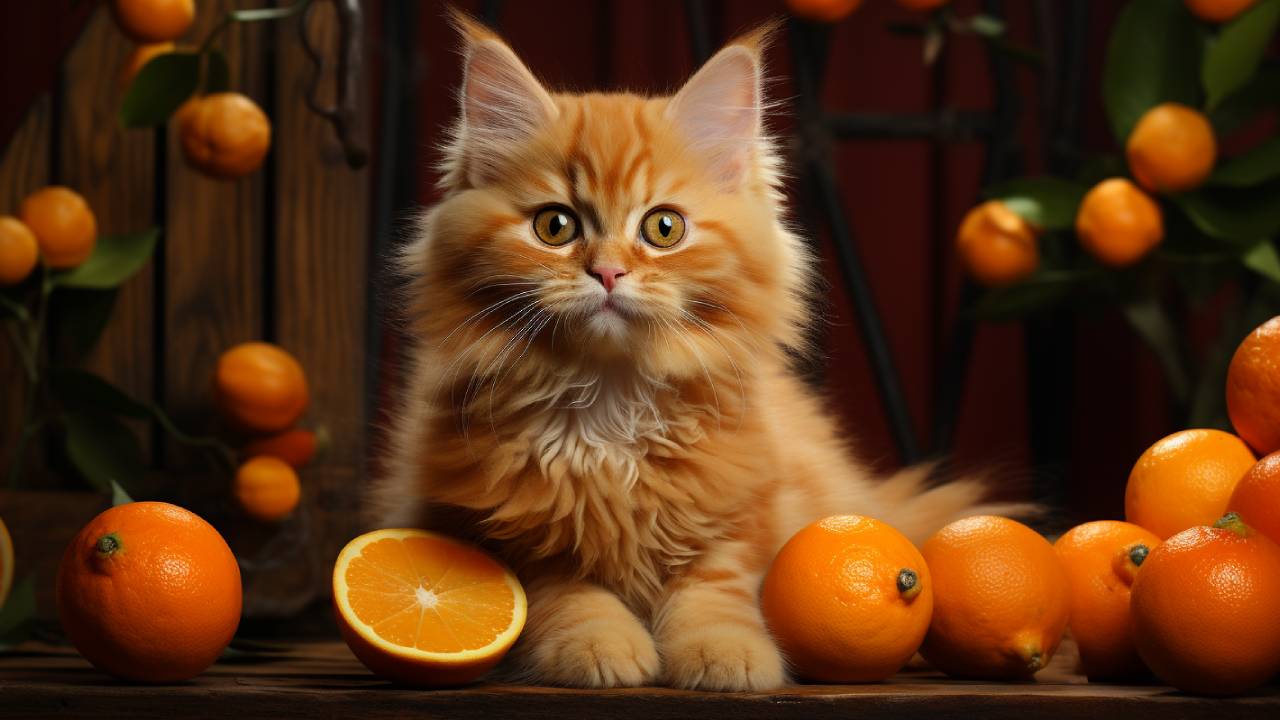Cats are known for their curious and sometimes picky eating habits. As responsible pet owners, we must know what foods are safe for our feline friends and what should be kept far away from their diet.
One fruit that often raises questions among cat owners is oranges. Can cats eat oranges? The answer is a straightforward “NO.” Oranges are a nutritious and delicious snack for humans but unsuitable for our furry companions.
Let’s explore why oranges should be off the menu for your cat and the potential risks they pose to feline health.
Why Are Oranges Bad for Cats?
While oranges are a popular and nutritious human treat, they are not recommended for cats. Cats have unique dietary requirements due to their status as obligate carnivores, meaning they thrive on a diet primarily composed of animal-based proteins.
However small amounts of other foods can sometimes be tolerated, oranges and other citrus fruits should be avoided for several reasons:
- Toxic Compounds: Oranges contain compounds such as limonene and psoralens, which can harm cats. These compounds are found in the essential oils of citrus fruits and can cause digestive upset and adverse reactions in felines.
- Sensitive Digestive Systems: Cats have sensitive digestive systems that may not tolerate the acidity and natural sugars found in oranges. Their digestive systems are designed to process meat efficiently, and introducing unfamiliar foods can lead to gastrointestinal distress.
- Potential Allergic Reactions: Some cats may have allergic reactions to the compounds present in oranges. These reactions can manifest as itching, swelling, or even more severe allergic responses.
- Nutritional Imbalance: Cats’ specific dietary needs are best met through high-quality cat food formulated to provide the essential nutrients they require. Oranges do not contribute to a balanced feline diet and may disrupt the nutrient balance if consumed.
Oranges aren’t the only human food that can pose risks to your cat—explore more about human foods to avoid for cats and keep your feline friend safe.
Signs & Symptoms of Cat Ate an Orange
If your cat has managed to nibble on an orange, your primary concern might pivot to what comes next. Although oranges aren’t toxic to cats in the severe sense, they’re far from a recommended snack due to their essential oil content and citrus compounds, which can be harmful. To ensure you’re prepared for any health issues, including those arising from ingesting unhealthy foods, opting for cat insurance may save your cat`s life.
Here’s an expanded look at what signs and symptoms to watch for if your feline friend has ingested an orange and how you can respond to ensure their safety and well-being.
Gastrointestinal Upset and Behavioral Changes
The most immediate reactions may involve the digestive system, with vomiting and diarrhea acting as the body’s attempt to expel the irritant. Your cat may exhibit discomfort or pain around their abdomen, such as meowing more than usual or resisting touch. Aside from gastrointestinal symptoms, your cat may lose interest in food, even their favorite treats. For more information on how certain diets can affect your cat’s health, exploring dry foods and the risk of disease in cats is essential.
Look out for an unusual increase in water consumption, which can signify trying to flush out the irritant.

Physical Reactions & Dermatological Issues
Excessive drooling or pawing at the mouth could indicate that the citrus has caused irritation or discomfort. Though less common, some cats might exhibit signs of respiratory discomfort, including wheezing or shortness of breath, especially if they have a pre-existing condition like asthma.
In addition to direct skin irritation, your cat might start scratching more than usual due to the discomfort. Pay attention to any swelling around the face or paws, which could be a reaction to the citrus. Understand the bioactive compounds of citrus fruits and their effects to grasp why oranges pose a risk to cats.
Neurological Symptoms (Rare but Serious) In severe cases, a cat might display signs of ataxia, such as uncoordinated movements or staggering, as a reaction to the toxins.
A marked decrease in activity levels or a seeming disinterest in surroundings and normal activities could be observed.
Immediate Steps to Take
- Remove the Source: To prevent further ingestion, ensure no more orange or citrus fruit is within your cat’s reach.
- Observe and Document: Watch your cat closely for any of the symptoms mentioned and document what you observe, including the timing and severity of symptoms.
- Contact Your Veterinarian: Even if the symptoms seem mild, it’s prudent to contact your veterinarian. Provide them with all the details of what happened, including how much orange your cat ate and the symptoms you’ve observed.
To avoid incidents like this in the future, it’s wise to keep all citrus fruits and products containing citrus oils well out of your cat’s reach. Consider cat-proofing areas where food is stored or prepared, and always consult with a veterinarian before introducing any new foods into your cat’s diet.
Regular veterinary check-ups can also help catch any potential issues early, keeping your feline friend happy, healthy, and far away from unsuitable snacks like oranges. To better understand how dietary composition influences your cat’s food preferences and health, explore Food Preferences in Cats: The Effect of Dietary Composition and Intrinsic Variables on Diet Selection.

FAQs
Why do cats generally dislike the smell of oranges?
Cats have a highly sensitive sense of smell, and the strong citrus scent of oranges can overwhelm them. The essential oils and compounds found in oranges, such as limonene and linalool, are particularly aversive to cats, making the fruit unappealing.
Can the aroma of oranges be used as a natural cat repellent?
Yes, the potent citrus scent of oranges can be a natural deterrent for cats. Placing orange peels or a cloth soaked in orange oil in areas where you wish to discourage your cat from entering can help keep them at bay without causing harm.
Are there any health benefits in small amounts of oranges?
Oranges contain vitamin C, potassium, and fiber, which benefit humans. However, cats synthesize their vitamin C, and their dietary needs differ significantly. Therefore, cats have no health benefits from consuming oranges, so avoiding giving them to your feline friends is best.
What symptoms should I look out for if my cat accidentally eats it?
If your cat ingests oranges, watch for symptoms such as vomiting, diarrhea, depression, or a drop in appetite. Citrus fruits can cause stomach upset in cats and, in more severe cases, may lead to central nervous system depression.
Is it safe for cats to play with peels or toys scented with orange?
While playing with orange peels might not directly harm your cat, the oils can get on their fur and skin, leading to discomfort or a potential allergic reaction. Toys scented with artificial orange fragrance are generally safe, but ensuring the scent is not overwhelming, and the toy is free from small, ingestible parts is essential.
Consider cat tunnel bed options for a safer playtime alternative that keeps your cat entertained without the risks associated with citrus oils.
Can exposure to oranges cause allergic reactions in cats?
Yes, cats can have allergic reactions to oranges, manifesting as skin irritation or digestive upset. If you notice any signs of an allergic reaction, such as excessive scratching, redness of the skin, or other symptoms mentioned earlier, contact your veterinarian.






My cat loves oranges, but I heard they’re not good for them. What’s the deal with cats and citrus fruits?
Can they have a taste, or should I keep them away?
👍